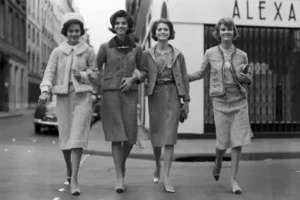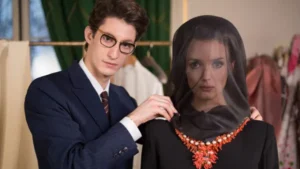Fashion has always been a dynamic and evolving art form, reflecting societal changes, cultural shifts, and technological advancements. Throughout the decades, certain designers have stood out for their innovative contributions, leaving an indelible mark on the industry. Here, we explore the evolution of fashion through the lens of iconic designers from the 1920s to the 1990s.
1920s: Coco Chanel

The 1920s were a period of significant social change, and Coco Chanel was at the forefront of this revolution. Chanel introduced a new, modernist approach to fashion, emphasizing simplicity, comfort, and elegance. She is credited with popularizing the “little black dress,” transforming it into an essential piece of every woman’s wardrobe. Chanel’s designs broke away from the restrictive corsets of the previous era, promoting a more liberated and practical style for women.
1950s: Christian Dior
After World War II, Christian Dior revolutionized fashion with his “New Look” in 1947. This iconic style featured cinched waists, full skirts, and an emphasis on femininity, marking a departure from the utilitarian fashion of the war years. Dior’s designs brought glamour and luxury back into women’s fashion, establishing Paris as the fashion capital of the world once again. The 1950s saw Dior’s influence everywhere, as women embraced his opulent and flattering silhouettes.
1960s: Yves Saint Laurent

The 1960s were a decade of experimentation and rebellion, and Yves Saint Laurent was a key figure in this transformative period. Saint Laurent introduced the world to “Le Smoking,” the first tuxedo suit for women, challenging traditional gender norms and redefining women’s fashion. He also embraced vibrant colors, ethnic influences, and pop culture, creating collections that resonated with the youthful and revolutionary spirit of the 1960s.
1970s: Vivienne Westwood
The 1970s were marked by the punk rock movement, and Vivienne Westwood was its fashion pioneer. Westwood’s provocative and rebellious designs, characterized by ripped fabrics, safety pins, and bold slogans, captured the spirit of the era. Her collaboration with the Sex Pistols and her store “SEX” became iconic symbols of punk fashion. Westwood’s influence extended beyond punk, as she continued to innovate and challenge the fashion establishment in the decades to follow.
1980s: Gianni Versace
The 1980s were synonymous with excess and glamour, and Gianni Versace epitomized this era with his bold and opulent designs. Versace’s use of bright colors, luxurious fabrics, and daring cuts made his collections instantly recognizable. He was a master of blending classical art with modern fashion, creating iconic looks that were both innovative and glamorous. Versace’s influence on the fashion industry is still felt today, with his brand continuing to thrive under the direction of his sister, Donatella Versace.
1990s: Alexander McQueen

Alexander McQueen emerged in the 1990s as one of the most avant-garde and provocative designers of his generation. Known for his theatrical runway shows and boundary-pushing designs, McQueen’s work often explored themes of beauty, nature, and the macabre. His collections featured impeccable tailoring, dramatic silhouettes, and intricate detailing. McQueen’s legacy continues to inspire and influence the fashion world, with his brand maintaining its reputation for innovation and artistry.
Conclusion
The evolution of fashion over the decades is a testament to the creativity and vision of these iconic designers. Each brought something unique to the industry, shaping the way we perceive and wear fashion today. From Coco Chanel’s timeless elegance to Alexander McQueen’s avant-garde masterpieces, these designers have left an indelible mark on the history of fashion, influencing generations of designers and fashion enthusiasts.
As we look to the future, it is clear that the legacy of these designers will continue to inspire and drive the ever-evolving world of fashion. Their contributions have not only defined the style of their respective eras but have also set the stage for future innovations and trends.



